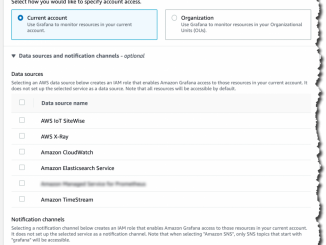
Amazon Managed Service for Grafana 미리보기 출시
Amazon Managed Service for Grafana 미리보기 출시 오늘 Grafana Labs와의 제휴를 통해 Amazon Managed Service for Grafana(AMG)가 평가판으로 출시됩니다. AMG는 여러 소스의 데이터 시각화 및 분석을 위해 확장 가능하고 안전한 온디맨드 Grafana WorkSpace를 쉽게 생성할 수 있는 완전관리형 서비스입니다. Grafana는 애플리케이션에 대한 관찰 대시보드를 만드는 데 사용되는 가장 인기 있는 오픈 소스 기술 중 하나입니다. 플러그형 데이터 원본 모델을 갖추고 있으며 다양한 종류의 시계열 데이터베이스 및 클라우드 모니터링 공급업체를 지원합니다. Grafana는 여러 오픈 소스, 클라우드 및 서드 파티 데이터 원본의 애플리케이션 데이터를 중앙 집중화합니다. 많은 고객이 Grafana를 좋아하지만 이를 자체 호스팅하고 관리하는 데 따른 부담은 원하지 않습니다. AMG는 Grafana의 프로비저닝, 설정, 확장, 버전 업그레이드 및 보안 패치를 관리하므로 고객이 이러한 작업을 직접 수행할 필요가 없습니다. AMG는 자동으로 확장되어 뛰어난 가용성으로 수천 명의 사용자를 지원합니다. AMG를 사용하면 AWS, Google, Microsoft 등의 클라우드 서비스를 비롯한 여러 데이터 원본의 운영 지표, 로그 및 [ more… ]



